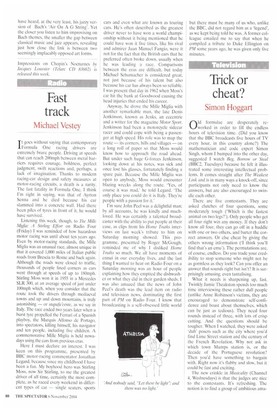Radio
Fast track
Michael Vestey
It goes without saying that contemporary Formula One racing drivers are extremely brave people. Driving at speeds that can reach 200mph between metal barriers requires courage, boldness, perfect judgment, swift reactions and, perhaps, a lack of imagination. Thanks to modern racing-car design and safety measures at motor-racing circuits, a death is a rarity. The last fatality in Formula One, I think I'm right in saying, was that of Ayrton Senna and he died because his car slammed into a concrete wall. Had there been piles of tyres in front of it, he would have survived.
Listening this week, though, to The Mille Miglia: A Stirling EffOm on Radio Four (Friday) I was reminded of how hazardous motor racing was until about ten years ago. Even by motor-racing standards, the Mile Miglia was an unusual race, almost unique in that it covered 1,000 miles of Italian public roads from Brescia to Rome and back again. Although the roads were closed to traffic, thousands of people lined corners as cars went through at speeds of up to 180mph. Stirling Moss won it in 1955 in a Mercedes SLR 300, at an average speed of just under 100mph which, when you consider that the route took the drivers through mediaeval towns and up and down mountains, is truly astonishing — or stupafa'cente, as we say in Italy. The race ended two years later when a burst tyre propelled the Ferrari of a Spanish playboy, the Marquis Alfonso de Portago, into spectators, killing himself, his navigator and ten people, including five children. A commemorative Mille Miglia is held nowadays using the cars from previous eras.
Here I must declare an interest. I was keen on this programme, presented by BBC motor-racing commentator Jonathan Legard, because since my childhood I have been a fan. My boyhood hero was Stirling Moss, now Sir Stirling, to me the greatest driver of all time, certainly the most complete, as he raced every weekend in different types of car — single seaters, sports cars and even what are known as touring cars. He's often described as the greatest driver never to have won a world championship without it being mentioned that he could have won it five times, like his rival and admirer Juan Manuel Fangio, were it not for the fact that the British cars that he preferred often broke down, usually when he was leading a race. Comparisons between the eras are difficult, but today Michael Schumacher is considered great, not just because of his talent hut also because his car has always been so reliable. I was present that day in 1962 when Moss's car hit the bank at Goodwood causing the head injuries that ended his career.
Anyway, he drove the Mille Miglia with another remarkable man, the late Denis Jenkinson, known as Jenks, an eccentric and a writer for the magazine Motor Sport. Jenkinson had been a motorcycle sidecar racer and could cope with being a passenger at high speed. His role was to map the route — its corners, hills and villages — on a long roll of paper so that Moss would know how to approach the road ahead. But under such huge G-forces Jenkinson, looking down at his notes, was sick and once lost his glasses, fortunately finding a spare pair. Because the Mille Miglia was open to anybody, Moss would encounter blazing wrecks along the route. 'Yes, of course it was mad,' he told Legard. The only place you could do it is Italy. They're people with a passion for it.'
I'm sure John Peel was a delightful man; by all accounts, he was kindly and muchloved. He was certainly a talented broadcaster with the ability to put people at their ease, as clips from his Home Truths interviews on last week's tribute to him on Saturday morning showed. This programme, presented by Roger McGough, reminded me of why I disliked Home Truths so much. We all have moments of ennui in our everyday lives, and the last thing I wanted to hear on Radio Four on a Saturday morning was an hour of people explaining how they emptied the dishwasher or what they did in their garden sheds. I was also amazed that the news of John Peel's death was the lead item on radio and television news, dominating the first part of PM on Radio Four. I know that broadcasting is a self-obsessed little world
but there must be many of us who, unlike the BBC, did not regard him as a 'legend', as we kept being told he was. A former colleague emailed me to say that when he compiled a tribute to Duke Ellington on PM some years ago, he was given only five minutes.


























































































































 Previous page
Previous page